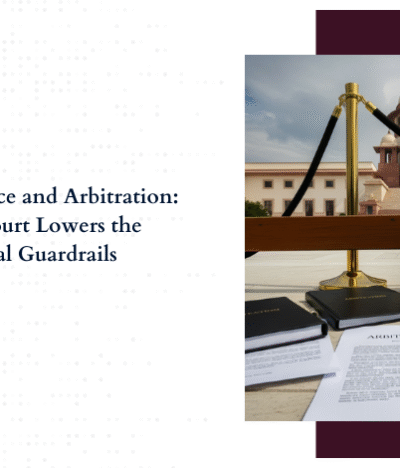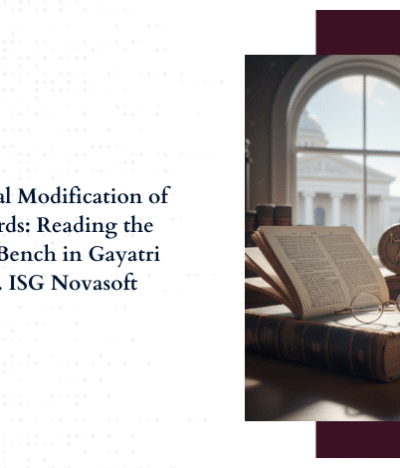Arbitration as an effective method of dispute resolution provides for a discourse of interim relief in Arbitral proceedings. The Indian Arbitration and Conciliation Act, 1996 lays down the powers of a Court and an Arbitral Tribunal in granting Interim relief before, during, or after any Arbitral proceedings. The parties to any Arbitration prioritise such interim measures of protection in order to ensure the efficacy of the rendered Arbitral Award. That prior to the 2015 amendment, the act provided sweeping powers to the court in granting Interim relief, however, the legislative body posts the aforementioned amendment stabilised the powers of both the Courts and Arbitral Tribunal in granting Interim reliefs in Arbitral proceedings.
This article is an attempt to analyse the persisting legal provisions surrounding the Courts and the Arbitral Tribunal’s power in granting Interim relief.
Interim Measures of Protection in Arbitral Proceedings
Interim reliefs are temporary orders/remedies granted by an adjudicatory body such as a Court or an Arbitral Tribunal to safeguard the rights of the parties to Arbitration. The necessity for interim relief in Arbitral Proceedings arises from the need to protect the parties’ interests before the final resolution of the dispute. In many cases, without such measures, a party might act in a way that makes any eventual Award invalid or difficult to enforce. Section 9 & Section 17 of The Arbitration and Conciliation Act, 1996 list these measures:
- Preservation of any goods constituting the subject matter of the Arbitral proceeding.
- Security for costs
- Detention, preservation, or inspection of any property or thing which is the subject matter of the dispute in arbitration,
- Interim injunction or the appointment of a receiver;
Provisions Granting Interim Relief
The legal framework surrounding interim measures of protection is incumbent upon jurisdiction and the rules governing the Arbitration. Institutional rules such as ICC Rules of Arbitration, SIAC etc possess specific procedures for granting interim measures. In Indian Context, the national law, The Arbitration and Conciliation Act, 1996 determines the framework behind interim measures of protection. Section 9 of The Arbitration and Conciliation Act, 1996 bestows upon the Courts the power to grant Interim reliefs. The parties often pray to safeguard the disputed amount or the asset in question. Authorising the Court to detain, preserve, or inspect the subject matter is amongst one such power.
In contrast, Section 17 of The Arbitration and Conciliation Act, 1996 determines the authority of an Arbitral Tribunal in granting Interim relief during an Arbitration proceeding. These measures are critical in ensuring that the party’s right to effectively enforce an Arbitral Award remains preserved.
The Legal Debate Surrounding The Power of Court and Arbitral Tribunal
Power of Arbitral Tribunals to grant Interim reliefs
A legal debate surrounds the concept of Interim reliefs The debate is about whether an Arbitral Tribunal’s power to grant interim relief under Section 17 is equivalent to a Court’s power under Section 9 of the Arbitration Act. However, owing to the legislative amendments and judicial precedents, the Tribunal’s powers have been equated with those of a Court while granting Interim relief.
Section 17 of the Arbitration Act, as amended recognises an Arbitral Tribunal’s Order for interim relief equivalent to that of a Court’s Order, thereby harmonising the power of both the adjudicating bodies.
Determining the scope of a Court’s power
Section 9(1) of the Arbitration Act, allows the parties to an Arbitration to seek interim protection from a Court before, during, or even after any Arbitration proceedings. According to Sub-section (3) of Section 9, once an Arbitral Tribunal has been instituted, the court does not hold the power to adjudicate on any request for interim relief. Such an amendment has been taken given the lengthy litigation, thereby reducing the number of applications submitted to the courts regarding these matters. It not only eliminates the burden on the Court but also provides a leeway to the Arbitral Tribunals to hold such equal power in an Arbitral proceeding.
However, the second prong provides an exception to this prohibition, that in cases of remedy offered under Section 17 being ineffective, the courts have the power to intervene and provide adequate interim relief.
Case Study
In ArcelorMittal Nippon Steel (India) Ltd. v. Essar Bulk Terminal Ltd.17, the Hon’ble Supreme Court clarified that it was never the legislative intention that even after the conclusion of Arbitral proceedings on an Application under Section 9, relief would be denied, forcing the parties to resort to Section 17 for remedy. It was also held that when an application has already undergone consideration or is in the process of being considered, there is no need to assess the effectiveness of the remedy under Section 17. This assessment is necessary only when the application is yet to be taken up for consideration.
Conclusion
Interim measures of protection are significant in effectively rendering an Arbitral Award. It assists the parties in safeguarding their interest and ensuring the integrity and effectiveness of the Arbitral proceedings. The Court may be empowered to grant interim relief before an Arbitral Award, however, it creates a lacunae by overstepping powers conferred on an Arbitral Tribunal under Section 17 of the Arbitration Act.
The pro-arbitration approach taken in numerous judicial precedents is made to extend the rightful powers to an Arbitral Tribunal and ensure a fair separation of powers. Such an evolution underscores the importance of a flexible approach towards granting Interim reliefs. However, with the advent of a strengthened Arbitration atmosphere, ensuring such Procedural consistency will be crucial.
Expert Legal Support for Securing Interim Relief in Arbitral Proceedings with ACM Legal
At ACM Legal, we specialize in navigating complex Arbitration proceedings with a focus on securing effective interim relief measures. Our expertise in Arbitration law, coupled with a deep understanding of The Arbitration and Conciliation Act, 1996 ensures that we provide strategic solutions to safeguard our client’s interests during every stage of the dispute resolution process. Whether it’s securing assets or protecting the subject matter of the arbitration, we offer tailored legal support to ensure the efficacy of the Arbitral Award.
FAQs
1. What are the interim relief under the Arbitration and Conciliation Act?
Interim measures of protection include preservation of the subject matter of the dispute; Detention, preservation, or inspection of any property or thing that is the subject matter of the dispute; security for costs or any other remedy
2. How can a party obtain interim measures of protection from an Arbitral Tribunal in India?
A party can make an application under Section 17 of the Arbitration Act for interim measures of protection from an Arbitral Tribunal once the Arbitral proceedings have been initiated. A party can also move an Application under Section 9 of the Arbitration Act, to seek interim relief from an appropriate Court before Arbitration proceedings have been initiated. The Arbitral Tribunal’s decision is binding and non-compliance can be enforced in the manner of a Court order.
3. Can a party seek interim measures from an Indian court during Arbitral proceedings?
Yes, a party can seek interim measures under Section 9 of the Arbitration and Conciliation Act, 1996 from an Indian court even if Arbitral proceedings are ongoing. The Courts can grant interim relief to protect the subject matter of the dispute, secure the enforcement of an Arbitration Agreement, or prevent harm to either party to the Arbitration. However, such measures are usually sought when the Arbitral Tribunal is not yet constituted or is unable to act swiftly.
4. What is the Enforceability of Interim relief granted by an Arbitral Tribunal or Court in India?
Interim reliefs granted by an Arbitral Tribunal are enforceable as per Section 17 of the Arbitration and Conciliation Act, 1996. If a party fails to comply, the other party can seek enforcement through an appropriate Court. Interim reliefs granted by an Indian court under Section 9 are Enforceable as court orders, and non-compliance can further lead to contempt proceedings.
5. What factors does a Court consider when granting Interim measures under Section 9?
When granting interim reliefs under Section 9, the Court typically considers, whether the party seeking relief has a valid and genuine ground for seeking that relief, whether the party will suffer irreparable harm if the reliefs are not granted, whether the balance of convenience favours granting the reliefs, whether there are other remedies available that would be sufficient.
Author: Venkatesh Kaushik, Associate
Co-Author: Eylah Singh, Intern






